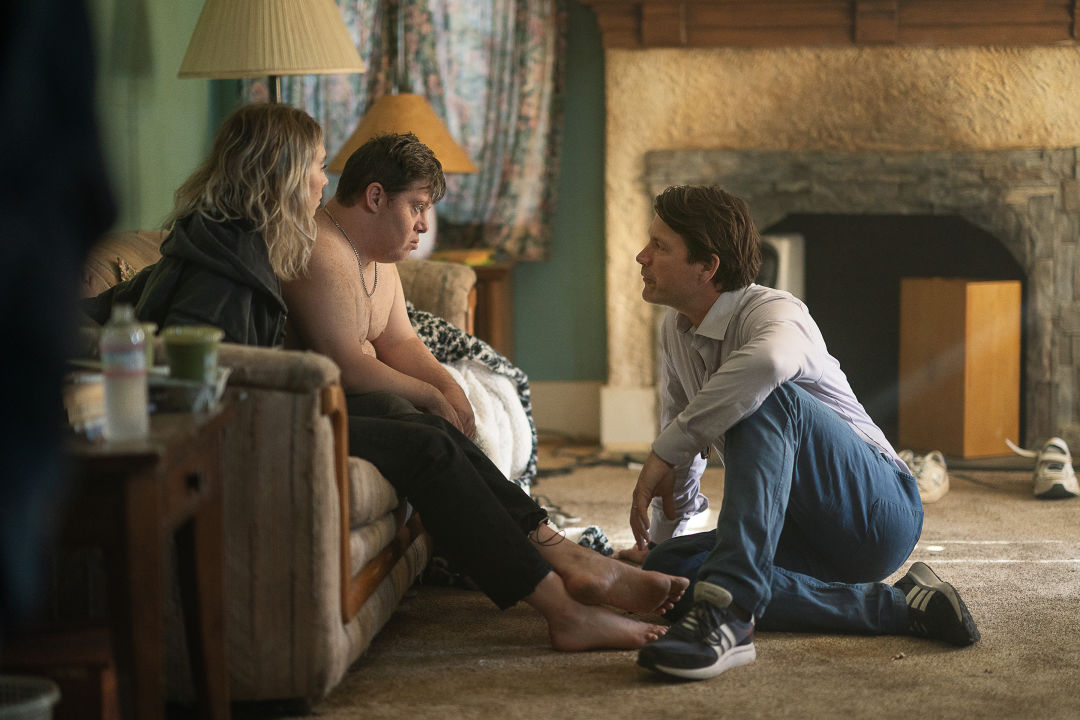‘Night Always Comes’ Is a Netflix Caricature of Portland

Vanessa Kirby (The Crown, Pieces of a Woman) stars in Night Always Comes, the latest Portland-set movie to hit streamers.
In 2021, The New York Times published the headline “Who Can Actually Afford to Live in Portland?” It wasn’t yet another national media story telling Portland about itself, but rather a book review—of a novel, no less. Portlander Willy Vlautin’s The Night Always Comes rendered the city’s cost-of-living crisis through one woman’s torment. Somehow, the book knit a lifelike portrait of systemic injustice into a quick, violent crime drama that careens through a single, momentous night—escorts, guns, cocaine, and a stolen Mercedes—without selling out its characters or its city. It had the flash and bang of a Netflix movie and the soul of a nuanced critique of the author’s hometown. Too bad that when the actual Netflix adaptation arrived, on August 15, it was a garbled mess possessing neither.
The broad strokes of book and movie are the same. Lynette, a baker/bartender/escort in her thirties played by Vanessa Kirby, is desperate to buy the dilapidated N Missouri Avenue house she rents with her mother (Jennifer Jason Leigh) and developmentally disabled brother (Zack Gottsagen) before they’re priced out of the city. When the plan goes amiss in the 11th hour, Lynette is forced to call in every favor and collect on every debt she can in a single night to come up with the down payment.
It’s a story about the conditions that drive a person to commit crimes, a Portland story that puts a living, breathing face to the abstract notion of a “cost of living.” What might you be capable of when everything you know is threatened? Lynette is a woman dragged by a particularly modern fate, not a professional criminal. But the movie, with its substantial omissions from the book and hybridizing of several characters, wants her to be both: someone damaged yet endearingly warm, with a real chance at finding a place among society, and someone exceedingly cold, with a thrilling hard edge and nothing left to lose. The script, adapted by Sarah Conradt and directed by Benjamin Caron (who’s helmed some episodes of The Crown and Andor), gets nowhere near the hijinks and stylized quirk of a Tarantino saga, and it’s a paltry attempt at the relentless anxiety of a Safdie brothers movie. Kirby is a talented actor—she won a BAFTA (The Crown) and is an Academy Award nominee (Pieces of a Woman)—but nobody could make this whittled character’s motives legible.

Kirby and Zack Gottsagen on set with director Benjamin Caron.
There are signs of life in the supporting cast, however. The morning they’re supposed to buy the house, Lynette’s mother spends the down payment on a car instead. “I’m allowed to spend my own money,” she tells Lynette. Her tone is insecure, slight, head-down. She knows it’s a nonsense excuse, but the real truth is unspeakable. So she carries on in her bug-eyed sunglasses. She even stopped for a sandwich and soda on the way home—props to reinforce the charade of a normal day. It’s not that big of a deal. The wordless depth Leigh brings to the scene is the kind of human texture this story demands—a performance capable of making a sandwich a last stab at agency in a predetermined life.
Lynette, who’s been working three jobs for years to stay afloat, is incredulous. This is the real kernel of the story: one character defeated by her lifelong struggle with poverty, the next generation still clawing her way to the surface. And so begins Lynette’s depraved night in this caricature of our burned-out city, where sideshows take over intersections, West Hills mansions host seedy underground sex clubs, and the one Black coworker almost definitely knows how to crack a safe and turn a stolen Mercedes into cash.
More than creating empathy for the city’s most downtrodden corners, the movie seems bent on juxtaposing its haves and have-nots: Lynette in her beat-up old car, crossing the river as dissonant music swells and the Ritz-Carlton’s tower glowers over the city, its complicated glass rippling in the sun. Then, street level, back to Lynette, applying clumpy mascara and giving her shirt a sniff test before she meets her client at the hotel’s restaurant in the sky.

Julia Fox gets a brief but memorable few minutes of screen time playing Gloria.
Randall Park plays her john. She has this idea, a thin preamble of asking him for a loan. “Is it a sexy idea?” he laughs, looking like the flimsiest cardboard cutout of a generic rich dude. He’s a composite of two book characters, a young psychopath and an older, more sympathetic and well-meaning guy. Tasked, single-handedly, with representing the entire emotional spectrum of her experience escorting, Park’s character is as fraught as Kirby’s. He snaps his fingers. “Two tequila on the rocks.” He laughs in her face, then backpedals to a half-assed “let’s be real” condolence. Sure, he knows her North Portland neighborhood “from the news sometimes.” Kirby’s eyes flip wildly between performed seduction and bones-deep desperation all the while. It’s as if both actors, trying to be so many characters simultaneously, can’t decide who they are.
Julia Fox (Uncut Gems) knows who she is: Gloria, a frenemy and fellow sex worker. “You smell bad. You look like shit,” she tells Lynette, when she shows up unannounced asking for the few thousand dollars she loaned her. Gloria shows off a Versace dress, complains about the beds at the Corona Del Mar Hyatt she and “Robert” just stayed at, and tells Lynette she doesn’t have the money. Gloria is everything Lynette is not, a foil: Lynette really is just doing this to get by, while Gloria is doing it for the Versace.

Jennifer Jason Leigh brings a depth missing from much of the film, playing the protagonist’s defeated mother.
As we crisscross the river throughout the night, ominous music plays over wide shots that pan from whichever bridge to big, glassy buildings that sparkle evilly, like some ad condemning gentrification. In all of its costumed menace, the city itself is presumably intended to eat Lynette whole. Emotionally, that’s exactly what happens as she retraces her enigmatic past to cobble together the money. “So is this like a trip down memory lane?” a guy who looks like he works for Salesforce and pretends to be Gary Oldman’s character in True Romance on the weekends asks, as he tries to turn a cocaine deal into sex.
“I’m not that person anymore,” Lynette tells her mother in a later scene. “I don’t do that anymore.” But we never met this person. Who? What? The pieces of her past that come together throughout the night never cohere. We got the AI summary of headlines, not the novel. Vlautin’s book is about a person overcoming her own struggles and trudging resiliently through a remarkably difficult yet all-too-common hand in life. In this movie, that same character is reduced to a victim, a hapless product of a cartoonishly wrecked city.
Share this content:















Post Comment